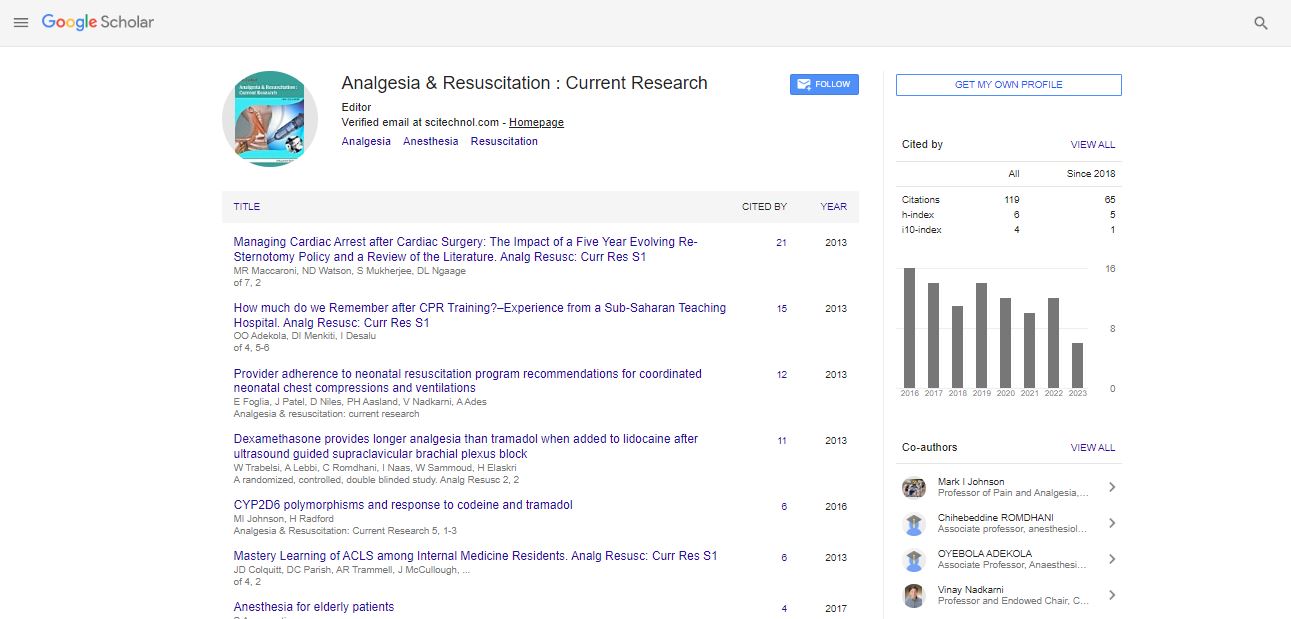Perspective, Analg Resusc Curr Res Vol: 12 Issue: 1
Preoperative Care for Optimal Patient
Julian Schior*
Department of Surgical Nursing, University of Health Sciences Turkey, Istanbul, Turkey
*Corresponding Author: Julian Schior
Department of Surgical Nursing
University of Health Sciences Turkey
Istanbul, Turkey
E-mail: Julian.schior@gmail.com
Received date: 01 February, 2023, Manuscript No. ARCR-23-95842;
Editor assigned date: 03 February, 2023, PreQC No. ARCR-23-95842 (PQ);
Reviewed date: 17 Febrary, 2023, QC No. ARCR-23-95842;
Revised date: 24 February, 2023, Manuscript No. ARCR-23-95842(R);
Published date: 03 March, 2023, DOI: 10.4172/ 2324-903X.1000107.
Citation: Schior J (2023) Preoperative Care for Optimal Patient. Analg Resusc: Curr Res 12:1.
Description
Preoperative care is a crucial aspect of patient management in surgical settings. It encompasses the care provided to patients from the time they are scheduled for surgery until their complete recovery. Effective perioperative care not only promotes optimal patient outcomes but also contributes to improved patient satisfaction and reduced healthcare costs key components of peroperative care and highlight the importance of comprehensive and holistic care for patients undergoing surgery.
Preoperative care
Preoperative care begins when a patient is scheduled for surgery and continues until the patient is transferred to the operating room. It involves a series of assessments, interventions, and preparations to ensure that the patient is physically and emotionally ready for the surgical procedure.
Preoperative assessment: A thorough assessment of the patient's physical and psychological status is conducted to identify any potential risks or complications that may arise during the surgery. This assessment includes obtaining a detailed medical history, conducting a physical examination, reviewing relevant laboratory and diagnostic test results, and assessing the patient's psychological well-being. Any existing health conditions, allergies, or medications the patient is taking should be thoroughly documented to guide the surgical team in planning and implementing the surgery.
Patient education: Educating the patient about the surgical procedure, expected outcomes, and postoperative care is an important component of preoperative care. This includes explaining the risks and benefits of the surgery, providing information about anesthesia and pain management and discussing postoperative expectations and activities. This helps the patient to be mentally prepared for the surgery, alleviates anxiety and promotes patient engagement in their own care.
Surgical site preparation: Proper preparation of the surgical site is essential to reduce the risk of surgical site infections. This includes thorough skin cleansing and hair removal, as per hospital protocols, to prevent the introduction of pathogens during surgery. In some cases, prophylactic antibiotics may be administered as per the surgical team's guidelines.
NPO (nothing by mouth) status: It is important to ensure that the patient adheres to the NPO status as prescribed, which restricts oral intake for a specified duration before surgery. This minimizes the risk of aspiration during anesthesia induction, reducing the chances of postoperative pulmonary complications.
Preoperative medications: Medications such as sedatives or anxiolytics may be administered as per the surgeon's order to help the patient relax before surgery. However, it is important to adhere to the hospital's policies and procedures and ensure that the medications are administered safely, considering the patient's individual needs and any contraindications.
Intraoperative care
Intraoperative care begins when the patient enters the operating room and continues until the patient is transferred to the Post- Anesthesia Care Unit (PACU). It involves the management of the patient during the surgical procedure.
Anesthesia administration: Anesthesia is an important component of surgical care, and its administration is carefully monitored by an anesthesiologist. The type and dosage of anesthesia administered are based on the patient's individual needs, medical history, and the surgical procedure being performed. Continuous monitoring of the patient's vital signs, including heart rate, blood pressure, oxygen saturation, and respiratory rate, is done throughout the surgery to ensure the patient's safety and well-being.
Surgical team coordination: The surgical team, including the surgeon, nurses, and other healthcare professionals, work collaboratively to ensure that the surgical procedure is performed smoothly and safely. This involves effective communication, proper hand hygiene, and adherence to aseptic techniques to prevent surgical site infections. The surgical team also ensures that all necessary surgical instruments, equipment, and supplies are available and properly functioning.

